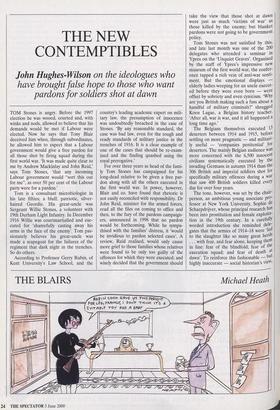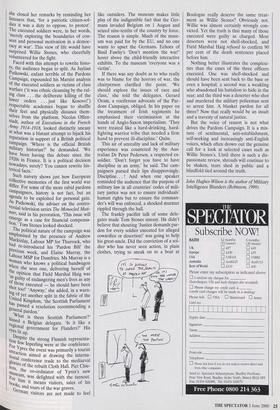THE NEW CONTEMPTIBLES
John Hughes-Wilson on the ideologues who
have brought false hope to those who want pardons for soldiers shot at dawn
TOM Stones is angry. Before the 1997 election he was wooed, courted and, with winks and nods, allowed to believe that his demands would be met if Labour were elected. Now he says that Tony Blair deceived him when, through subordinates, he allowed him to expect that a Labour government would give a free pardon for all those shot by firing squad during the first world war. 'It was made quite clear to me by Andrew Mackinlay and John Reid,' says Tom Stones, 'that any incoming Labour government would "sort this out for me", as over 50 per cent of the Labour party were for a pardon.'
Tom is a consultant microbiologist in his late fifties; a bluff, patriotic, silver- haired Geordie. His great-uncle was Sergeant Willie Stones, a volunteer with 19th Durham Light Infantry. In December 1916 Willie was courtmartialled and exe- cuted for 'shamefully casting away his arms in the face of the enemy'. Tom pas- sionately believes his great-uncle was made a scapegoat for the failures of the regiment that dark night in the trenches. So do others.
According to Professor Gerry Rubin, of Kent University's Law School, and the country's leading academic expert on mili- tary law, the presumption of innocence was undoubtedly breached in the case of Stones. 'By any reasonable standard, the case was bad law, even for the rough and ready standards of military justice in the trenches of 1916. It is a clear example of one of the cases that should be re-exam- ined and the finding quashed using the royal prerogative.'
For over three years as head of the fami- ly Tom Stones has campaigned for his long-dead relative to be given a free par- don along with all the others executed in the first world war. In power, however, Blair and co. have found that rhetoric is not easily reconciled with responsibility. Dr John Reid, minister for the armed forces, read all the files on coming to office and then, to the fury of the pardons campaign- ers, announced in 1998 that no pardon would be forthcoming. While he sympa- thised with the families' distress, it 'would be invidious to pardon selected cases'. A review, Reid realised, would only cause more grief to those families whose relatives were found to be only too guilty of the offences for which they were executed; and wisely decided that the government should take the view that those shot at dawn were just as much 'victims of war' as those killed by the enemy; but blanket pardons were not going to be government policy.
Tom Stones was not satisfied by this, and late last month was one of the 200 delegates who attended a seminar in Ypres on the 'Unquiet Graves'. Organised by the staff of Ypres's impressive new museum of the first world war, the confer- ence tapped a rich vein of anti-war senti- ment. But the emotional displays elderly ladies weeping for an uncle execut- ed before they were even born — were offset by sobriety and even cynicism. 'Why are you British making such a fuss about a handful of military criminals?' shrugged Koen Lagae, a Belgian history teacher. `After all, war is war, and it all happened a long time ago.' The Belgians themselves executed 13 deserters between 1914 and 1915, before settling on more pragmatic — and militari- ly useful — 'companies penitential' for deserters. The mainly Belgian audience was more concerned with the 6,500 innocent civilians systematically executed by the invading Germans in autumn 1914 than the 306 British and imperial soldiers shot for specifically military offences during a War that saw 400 British soldiers killed every day for over four years. The tone, however, was set by the chair person, an ambitious young associate pro- fessor at New York University, Sophie de Schaepdrijver, whose principal research has been into prostitution and female exploita- tion in the 19th century. In a carefully worded introduction she reminded dele- gates that the armies of 1914-18 were 'led to the slaughter like so many great herds . . . with fear, and fear alone, keeping them in line: fear of the blindfold; fear of the execution squad; and fear of death at dawn'. To reinforce this fashionable —.but highly inaccurate — social historian's view' she closed her remarks by reminding her listeners that, 'for a patriotic citizen-sol- dier it was a duty to oppose, to protest'. The executed soldiers were, in her words, `merely exploring the boundaries of con- sent and personal motivation in a democ- racy at war'. This view of life would have surprised Willie Stones, who cheerfully volunteered for the fight. Faced with this attempt to rewrite histo- ry, the audience began to split. As Juylian Putkowski, enfant terrible of the Pardons Campaign, expounded his Marxist analysis of the executed soldiers as victims of class warfare (it was ethnic cleansing by the M- ing class . . . the deliberate killing of the lower orders . . . just like Kosovo!') respectable academics began to shuffle their feet and physically distance them- selves from the platform. Nicolas Offen- stadt, author of Executions in the French Army 1914-1918, looked distinctly uneasy at what was a blatant attempt to hijack his reputation in support of a British political campaign. 'Where is the official British Military historian?' he demanded. 'We have been having this debate since the 1920s in France. It is a political decision nowadays, surely? You cannot rewrite his- torical facts.'
Such naivety shows just how European collective memories of the first world war differ. For some of the more rabid pardons campaigners, history is not fact, but an agenda to be exploited for personal gain. As Putkowski, the adviser on the contro- versial television series The Monocled Muti- neer, said in his peroration, 'This issue will emerge as a case for financial compensa- tion.' Tom Stones looked shocked. The political nature of the campaign was emphasised by the presence of Andrew Mackinlay Labour MP for Thurrock, who had re-introduced his 'Pardon Bill' the Previous week, and Elaine Murray, the Labour MSP for Dumfries. Ms Murray is a woman who knows a political bandwagon when she sees one, delivering herself of the opinion that Field Marshal Haig was as guilty of endangering men's lives as any of those executed — he should have been shot too!' Anyway,' she added, in a warn- ing of yet another split in the fabric of the has Kingdom, 'the Scottish Parliament riaS passed a resolution recommending a general pardon.' :What is thees Scottish Parliament?' _Fussed a Belgian delegate. 'Is it like a regional lit up. eyes government for Flanders?' His tioDesPite the strong Flemish representa- h few Ieperling were at the confeience. Ypres the event was primarily a tourist ztoOtrraction aimed at drawing the interna- tional conference trade to the mediaeval glories of the rebuilt Cloth Hall. Piet Chie- '11;11..s, the co-ordinator of Ypres's new pou`s_ cum, was delighted with the turnout. books imandit means visitors, sales of his tours of the war graves. German visitors are not made to feel like outsiders. The museum makes little play of the indigestible fact that the Ger- mans invaded Belgium on 1 August and seized nine-tenths of the country by force. The reason is simple. Much of the muse- um was paid for by the EU, and no one wants to upset the Germans. Echoes of Basil Fawlty's 'Don't mention the war!' hover above the child-friendly interactive exhibits. To the museum 'everyone was a victim'.
If there was any doubt as to who really was to blame for the horrors of war, the chairperson clarified the point. 'We should explore the issues of race and class,' she told the delegates. Gerard Oram, a vociferous advocate of the Par- dons Campaign, obliged. In his paper on the treatment of Irish regiments he emphasised their victimisation at the hands of Anglo-Saxon imperialism. 'They were treated like a hard-drinking, hard- fighting warrior tribe that needed a firm hand to prevent ill-discipline.' Quite.
This air of unreality and lack of military experience was countered by the Aus- tralian Dr Peter Pedersen, a respected ex- soldier. 'Don't forget you have to have discipline in an army,' he said. The cam- paigners pursed their lips disapprovingly. Discipline. . . ! And when one speaker reminded the audience that the purpose of military law in all countries' codes of mili- tary justice was not to ensure individuals' human rights but to ensure the comman- der's will was enforced, a shocked murmur rippled through the hall.
The frankly pacifist talk of some dele- gates made Tom Stones uneasy. He didn't believe that shouting 'Justice demands par- don for every soldier executed for alleged cowardice or desertion!' was going to help his great-uncle. Did the conviction of a sol- dier who has never seen action, in plain clothes, trying to sneak on to a boat at Boulogne really deserve the same treat- ment as Willie Stones? Obviously not. Willie was almost certainly wrongly con- victed. Yet the truth is that many of those executed were guilty as charged. Most deserters were not shell-shocked, and Field Marshal Haig refused to confirm 90 per cent of the death sentences placed before him.
Nothing better illustrates the complexi- ties than the cases of the three officers executed. One was shell-shocked and should have been sent back to the base or even a hospital; a second was a weakling who abandoned his battalion to hide in the rear; and the third was a deserter who shot and murdered the military policeman sent to arrest him. A blanket pardon for all three? Now that really would be an insult and a travesty of natural justice.
But the voice of reason is not what drives the Pardons Campaign. It is a mix- ture of sentimental, anti-establishment, self-seeking and increasingly anti-English voices, which often drown out the genuine call for a look at selected cases such as Willie Stones's. Until there is such a dis- passionate review, shrouds will continue to be shaken, tears shed in public and a blindfold tied around the truth.
John Hughes-Wilson is the author of Military Intelligence Blunders (Robinson, 1999).






































































 Previous page
Previous page